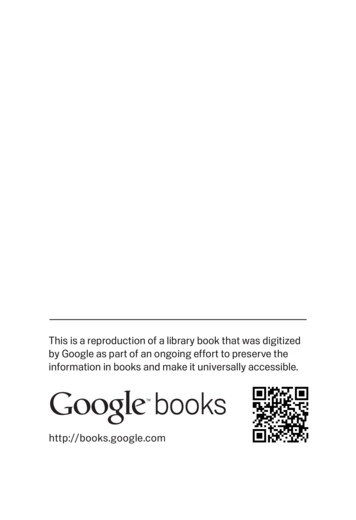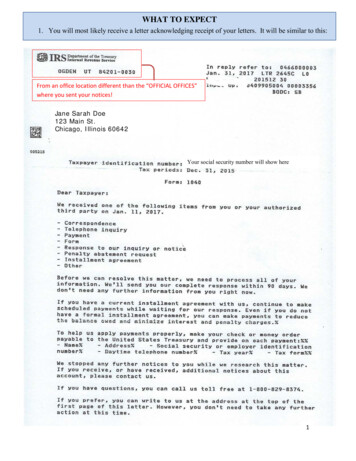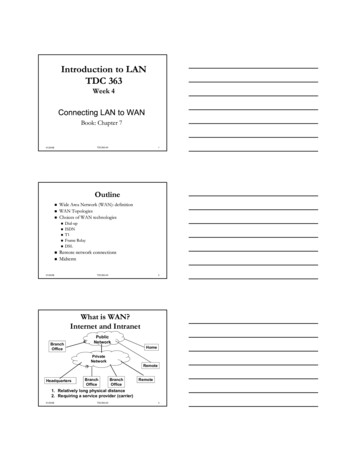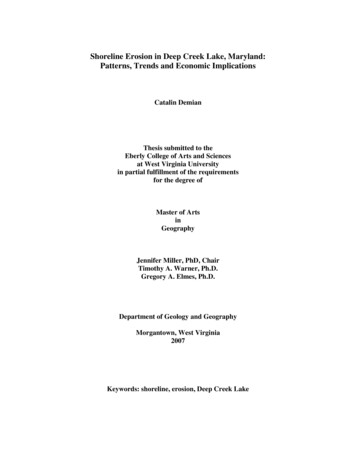
Transcription
This is a reproduction of a library book that was digitizedby Google as part of an ongoing effort to preserve theinformation in books and make it universally accessible.http://books.google.com
PRINCETONUNIVERSITYV LIBRARY /In Memory ofWilliam G. LarsenClass of1941
HARLEM SHADOWSTHE POEMS OFCLAUDE McKAYWITH AN INTRODUCTION BYMAX EASTMANNEW YORKHARCOURT, BRACE AND COMPANY
PS1922.COPYRIGHT, 1922, BYHARCOURT, BRACE AND COMPANY, INC.PRINTED IN THE U. 8. A. BYTHE gUINN & BODEN COMPAN'RAHWAY. N. J.
A number of these poems appeared inthe Seven Arts, Pearson's, The Liberator, The Messenger, and The CambridgeMagazine (England) .// ;; ,-f-
CONTENTSINTRODUCTIONAUTHOR'S WORDtXxixAMERICATOTHEONEEASTERCOMING6 FLOWERNORTHJ4\ "ALFONSO,THE TROPICSDRESSINGIN NEWTO YORKWAIT AT8 TABLEI FLAME HEART Q ONHOMEBROADWAYTHOUGHTS12 //, THE BARRIERIJ, - ADOLESCENCEHOMING SWALLOWS1415THE CITY'S LOVE l6J NORTH AND SOUTHIfWILDTHE PLATEAUMAYl8 IQ- - CITYNEEDLE212J22 2084MY MOTHER 26 J - DECEMBER,IN BONDAGEIQIQ28 20V HERITAGE JOWHEN I HAVE PASSED AWAYy31
ContentsJENSLAVEDJ2 1AFRICAMORNINGSHALL RETURN35JOY 34 JJON A PRIMITIVEWINTERIN THECANOECOUNTRY36TO WINTER 3QONSPRINGTHE INROADNEW41HAMPSHIREJ/, 40DAWNTHE HARLEMIN NEW DANCERYORK 4342' OUTCASTTHE TIRED 45WORKER44I KNOW MY SOUL 46BIRDS OF PREY 47THE CASTAWAYS 48EXHORTATION: SUMMER, 1919THE LYNCHING 51BAPTISMIF WE MUST52 DIE49JJSUBWAY WIND 54APOETRYTOTHEPRAYERANIGHTPOET5658FIRE57 5JWHEN DAWN COMES TO THE CITYOABSENCEWORD I LOVE64 TO SING 5jRESTACOURAGESUMMERREDINFLOWERPEACEMORN70IN6867 NEW HAMPSHIRE6066
ContentsTO 0. E. A. 7/ - ROMANCEFLOWER OF 7JLOVEv75THEPALOMALASNOW FAIRYIN LONDONj6.j A MEMORY OF JUNE fQ' FLIRTATION 8l\ TORMENTED 82\J ' POLARITYONE YEAR AFTER8384JFRENCH LEAVE 86JASMINES 88COMMEMORATION 80MEMORIAL 00THIRST 02FUTILITY Q3THROUGH AGONY 04f8 \vii
x
INTRODUCTIONracesTheseof poemsman becausehave a theyspecialareinterestsung byfor givethatTheya positionracearein theinpoetry.ourfirstliteraturesignificantWe triedtov C .' ;' **»Paul Laurence Dunbar. We have excessivelywelcomed other black poets of minor talent, seeking in their music some distinctive quality otherthan the fact that they wrote it. But here forthe first time we find our literature vividly enriched by a voice from this most alien raceamong us. And it should be illuminating toobserve that while these poems are characteristic* of that race as we most admire it—they aregentle-simple, candid, brave and friendly, quickof laughter and of tears—yet they are still morecharacteristic of what is deep and universal inmankind. There is no special or exotic kind ofmerit in them, no quality that demands a transmutation of our own natures to perceive. Justas the sculptures and wood and ivory carvings of
xI\Introductionthe vast forgotten African Empires of Ife andBenin, although so wistful in their tranquillity,are tranquil in the possession of the qualities ofall classic and great art, so these poems, thepurest of them, move with a sovereignty that isnever new to the lovers of the high music ofhuman utterance./""'It is the peculiarity of his experience, ratherI than of his nature, that makes this poet's race aI fact to be remembered in the enjoyment of hisUongs.childrenofworldthe canpoet,TheoftouchAfricanandsubjectnoor ienceotheris the raceexperienceofin theClaude McKay was born in 1890 in a littlethatched house of two rooms in a beautiful valley of the hilly middle-country of Jamaica. Hewas born to the genial, warm, patient, neighborly farmer's life of that island. It was a liferich in sun and sound and color and emotion, aswe can see in his poems which are foreverhomeward yearning—in the midst of their presentpassion and strong will into the future, forevervividly remembering. Like a blue-bird's note ina March wind, those sudden clear thoughts of
Introductionxithe warm South ring out in the midst of his northern songs. They carry a thrill into the depthof our hearts. Perhaps in some sense they arethoughts of a mother. At least it seems inevitable that we should find among them thosetwo sacred sonnets of a child's bereavement. Itseems inevitable that a wonderful poet shouldhave had a wise and beautiful mother.We can only distantly imagine how the happytropic life of play and affection, became shadowedand somber for this sensitive boy as he grew,by a sense of the subjection of his people,and the memory of their bondage to an alienrace. Indeed the memory of Claude McKay'sfamily goes back on his mother's side beyondthe days of bondage, to a time in Madagascarwhen they were still free, and by the grace ofGod still "savage." He learned in early childhood the story of their violent abduction, andhow they were freighted over the seas in ships,and sold at public auction in Jamaica. He learnedanother story, too, which must have kindled afire that slept in his blood—a story of the rebellion of the members of his own family at theauction-block. A death-strike, we should call it
xiiIntroductionnow—for they agreed that if they were dividedand sold away into different parts of the countrythey would all kill themselves. And this factsolemnly announced in the market by the oldestwhite-haired Negro among them, had such aneffect upon prospective buyers that it was impossible to sell them as individuals, and so they wereall taken away together to those hills at Clarendonwhich their descendants still cultivate. With theblood of these rebels in his veins, and their memory to stir it, we cannot wonder that ClaudeMcKay's earliest boyish songs in the Jamaica dialect were full of heresy and the militant love offreedom, and that his first poem of political significance should have been a rally-call to thestreet-car men on strike in Kingston. He foundhimself by an instinctive gravitation singing inthe forefront of the battle for human liberty. Awider experience and a man's comprehension ofthe science of history has only strengthened hisvoice and his resolution.Those early songs and the music he composedfor them, were very popular in Jamaica. ClaudeMcKay was quite the literary prince of the islandfor a time—a kind of Robert Burns among his
Introductionxiiiown people, as we can imagine, with his physicalbeauty, his quick sympathy, and the magnetic wayward humor of his ways. He received inI 1912 the medal of the Institute of Arts andt Sciences in recognition of his preeminence. Hewas the first Negro to receive this medal, andhe was the first poet who ever made songs in thequaint haunting dialect of the island. But nevertheless it was not until he came to the UnitedStates that Claude McKay began to confrontthe deepest feelings in his heart, and realize thata delicate syllabic music could not alone expressthem. Here his imagination awoke, and thecolored imagery that is the language of all deeppassion began to appear in his poetry. Heretoo he conceived and felt the history and positionof his people with mature poetic force. He knewthat his voice belonged not only to his own moodsand the general experience of humanity, but tothe hopes and sorrows of his race.A great many foolish things are said even bywise people upon the subject of racial inferiority. They seem to think that if science couldestablish a certain difference of average abilityas between the whites and blacks, that would,-
xivIntroductionjustify them in placing the whole of one of theseraces in a position of inferior esteem. The samefallacy is committed in the discussions of sexinferiority, and it is worth while to make clearthe perfect folly of it. If any denned quantitative difference is ever established between theaverage abilities of such groups, it will be arelatively slight one. The difficulty of establishing it, is a proof of that. And a slight differencein the general average would have no applicationwhatever as between any two individuals, or anyminor groups of individuals. The enormous majority of both races, as of both sexes, would showthe same degree of ability. And so great is thefactor of individual variation that we could noteven be sure an example of the highest abilitymight not arise in the group whose average was"inferior." This simple consideration of fact andgood logic should suffice to silence those whothink they can ever appeal to science in supportof a general race or sex prejudice.dominantBut in soandfara assubjectedthe problemrace, arisesit is impossiblebetween a forFor sciencea fair generalto say anythingtest is impossible.even as to Theaverages.chil-
Introductionxvdren of the subjected race never have a chance.To be deprived at the very dawn of selfhood ofa sense of possible superiority, is to be undernourished at the point of chief educative importance. And to be assailed in early childhood witha pervading intimation of inferiority is poison inthe very centers of growth. Except for people ofthe highest force of character, therefore, to beborn into a subjected race is to grow up inferior,not only to the other race, but to one's own potential self. We see an example of this kind ofgrowth in the bombastic locutions of the traditional "darkie" who has acquired a little culture.Those great big words and long sentences are theresult of a feeling of inferiority. They are apathetic over-correction of the very quality ofsimple-heartedness which is carried so high inthese poems of Claude McKay. It is carried sohigh, and made so boldly beautiful, that we cannot withhold a tribute to his will, as well as tohis music and imagination. The naked force ofcharacter that we feel in those two recent sonnets, "Baptism" and "The White City," is nomere verbal semblance. Its reality is certified bythe very achievement of such commanding art
xviIntroductionin the face of a contemptuous or condescendingcivilization.Claude McKay came to the United States in11912, having been offered an education here byp friend in Jamaica who believed in his abilities.His intention was to learn scientific farming, andreturn to the island to offer practical wisdom aswell as music to his people. He went at first toone of our established philanthropic institutionsfor the training of colored people. He stayedthere a few months—long enough to weary ofthe almost military system of discipline. Andthen he went to the Agricultural College ofKansas, where he had learned that a free lifeand a more elective system of education prevailed.He studied for two years there, thinking continually less about farming and more about literature, and gradually losing away altogether theidea of returning to live in Jamaica. He left the college in 1914, knowing that he was a poet—andimagining, I think, that he was a rather irresponsible and wayward character—to cast in his lotwith the working-class Negroes of the north.Since then he has earned his living in everyone of the ways that the northern Negroes do,
Introductionxviifrom "pot-wrestling" in a boarding-house kitchento dining-car service on the New York and Philadelphia Express. But like all true poets, he failedto take the duty of "earning a living" very seriously. It was a matter of collecting enough moneyfrom each new job to quit for a while and live.And with each period of living a new and a moresure and beautiful song would come out of him.The growth of beauty and sureness in thesesongs would be apparent if they were arrangedin the order of their creation. As it is, thereader will observe occasional lapses of quality.One or two of the rhythms I confess I am notable to apprehend at all. Perhaps they will bepicked up by receivers who are attuned to a different wave-length. But the quality is here inthem all—the pure, clear arrow-like transferenceof his emotion into our breast, without any butthe inevitable words—the quality that reminds usof Burns and Villon and Catullus, and all thepoets that we call lyric because we love them somuch. It is the quality that Keats sought tocherish when he said that "Poetry should begreat and unobtrusive, a thing which enters intothe soul, and does not startle or amaze with
xviiiIntroductionitself but with its subject." Poetry with thisquality is not for those whose interest is mainlyin the manufacture of poems. It will come ratherto those whose interest is in the life of things.It is the poetry of life, and not of the poet'schamber. It is the poetry that looks upon athing, and sings. It is possessed by a feeling andsings. May it find its way a little quietly andsoftly, in this age of roar and advertising, to thehearts that love a true and unaffected song.MAX EASTMAN.
AUTHOR'S WORDIn putting ideas and feelings into poetry, I havetried in each case to use the medium mostadaptable to the specific purpose. I own allegiance to no master. I have never found it possible to accept in entirety any one poet. But Ihave loved and joyed in what I consider the finestin the poets of all ages.The speech of my childhood and early youthwas the Jamaica Negro dialect, the native variantof English, which still preserves a few words ofAfrican origin, and which is more difficult ofunderstanding than the American Negro dialect.But the language we wrote and read in schoolwas England's English. Our text books then,before the advent of the American and Jamaicanreaders and our teachers, too, were all Englishmade. The native teachers of the elementaryschools were tutored by men and women of Britishimport. I quite remember making up verses inthe dialect and in English for our moonlight ring
xxAuthor's Worddances and for our school parties. Of our purelynative songs the jammas (field and road), shayshays (yard and booth), wakes (post-mortem),Anancy tales (transplanted African folk lore),and revivals (religious) are all singularly punctuated by meter and rhyme. And nearly all myown poetic thought has always run naturally intothese regular forms.Consequently, although very conscious of thenew criticisms and trends in poetry, to which Iam keenly responsive and receptive, I have adhered to such of the older traditions as I findadequate for my most lawless and revolutionarypassions and moods. I have not used patterns,images and words that would stamp me aclassicist nor a modernist. My intellect is notscientific enough to range me on the side ofeither; nor is my knowledge wide enough for meto specialize in any school.I have never studied poetics; but the formsI have used I am convinced are the ones I canwork in with the highest degree of spontaneityand freedom.I have chosen my melodies and rhythms byinstinct, and I have favored words and figures
Author's Wordxxiwhich flow smoothly and harmoniously into mycompositions. And in all my moods I havestriven to achieve directness, truthfulness andnaturalness of expression instead of an enameledoriginality. I have not hesitated to use wordswhich are old, and in some circles consideredpoetically overworked and dead, when I thoughtI could make them glow alive by new manipulation. Nor have I stinted my senses of the pleasure of using the decorative metaphor where it ismore truly and vividly beautiful than the exactphrase. But for me there is more quiet delightin "The golden moon of heaven" than in "Theterra-cotta disc of cloud-land."Finally, while I have welcomed criticism,friendly and unfriendly, and listened with willingattention to many varying opinions concerningother poems and my own, I have always, in thesumming up, fallen back on my own ear andtaste as the arbiter.CLAUDE MCKAY.
HARLEM SHADOWS
THE EASTER FLOWERFar from this foreign Easter damp and chillyMy soul steals to a pear-shaped plot of ground,Where gleamed the lilac-tinted Easter lilySoft-scented in the air for yards around;Alone, without a hint of guardian leaflIt Justburstlikethe atombfragileforbellfreedomof silversweetrime,and briefIn the young pregnant year at Eastertime;And many thought it was a sacred sign,And some called it the resurrection flower;And I, a pagan, worshiped at its shrine,Yielding my heart unto its perfumed power.,
TO ONE COMING NORTHAt first you'll joy to see the playful snow,Like white moths trembling on the tropic air,Or waters of the hills that softly flowGracefully falling down a shining stair.And when the fields and streets are covered whiteAnd the wind-worried void is chilly, raw,Or underneath a spell of heat and lightThe cheerless frozen spots begin to thaw,Like me you'll long for home, where birds' gladsongMeans flowering lanes and leas and spacesdry,And tender thoughts and feelings fine and strong,Beneath a vivid silver-flecked blue sky.4
To One Coming North5But oh! more than the changeless southern isles,When Spring has shed upon the earth hercharm,You'll love the Northland wreathed in goldensmilesBy the miraculous sun turned glad and warm./
AMERICAAlthough she feeds me bread of bitterness,And sinks into my throat her tiger's tooth,Stealing my breath of life, I will confessI love this cultured hell that tests my youth!Her vigor flows like tides into my blood,Giving me strength erect against her hate.Her bigness sweeps my being like a flood.Yet as a rebel fronts a king in state,I stand within her walls with not a shredOf terror, malice, not a word of jeer.Darkly I gaze into the days ahead,And see her might and granite wonders there,Beneath the touch of Time's unerring hand,Like priceless treasures sinking in the sand.
ALFONSO, DRESSING TO WAIT AT TABLEAlfonso is a handsome bronze-hued ladOf subtly-changing and surprising parts;His moods are storms that frighten and makeglad,His eyes were made to capture women's hearts.DownAn oldenin the songglory-holeof wineAlfonsoand clinkingsings glassesAnd riotous rakes; magnificently flingsGay kisses to imaginary lasses.Alfonso's voice of mellow music thrillsOur swaying forms and steals our hearts withjoy;And when he soars, his fine falsetto trillsAre rarest notes of gold without alloy.But, O Alfonso! wherefore do you singDream-songs of carefree men and ancientplaces?Soon we shall be beset by clamouringOf hungry and importunate palefaces.7
THE TROPICS IN NEW YORKBananas ripe and green, and ginger-root,Cocoa in pods and alligator pears,And tangerines and mangoes and grape fruit,Fit for the highest prize at parish fairs,Set in the window, bringing memoriesOf fruit-trees laden by low-singing rills,And dewy dawns, and mystical blue skiesIn benediction over nun-like hills.My eyes grew dim, and I could no more gaze;A wave of longing through my body swept,And, hungry for the old, familiar ways,I turned aside and bowed my head and wept.
FLAME-HEARTSo much have I forgotten in ten years,So much in ten brief years! I have forgotWhat time the purple apples come to juice,And what month brings the shy forget-me-not.I have forgot the special, startling seasonOf the pimento's flowering and fruiting;What time of year the ground doves brown thefieldsAnd fill the noonday with their curious fluting.I have forgotten much, but still rememberThe poinsettia's red, blood-red in warm December.I still recall the honey-fever grass,But cannot recollect the high days whenWe rooted them out of the ping-wing pathTo stop the mad bees in the rabbit pen.I often try to think in what sweet monthThe languid painted ladies used to dappleThe yellow by-road mazing from the main,Sweet with the golden threads of the rose-apple.I have forgotten—strange—but quite rememberThe poinsettia's red, blood-red in warm December.9
IOFlame-HeartWhat weeks, what months, what time of the mildyearWe cheated school to have our fling at tops?What days our wine-thrilled bodies pulsed withjoyFeasting upon blackberries in the copse?Oh some I know! I have embalmed the days,Even the sacred moments when we played,All innocent of passion, uncorrupt,At noon and evening in the flame-heart's shade.We were so happy, happy, I remember,Beneath the poinsettia's red in warm December.
HOME THOUGHTSOh something just now must be happening there!That suddenly and quiveringly here,Amid the city's noises, I must thinkOf mangoes leaning o'er the river's brink,And dexterous Davie climbing high above,The gold fruits ebon-speckled to remove,And toss them quickly in the tangled massOf wis-wis twisted round the guinea grass;And Cyril coming through the bramble-trackA prize bunch of bananas on his back;And Georgie—none could ever dive like him—Throwing his scanty clothes off for a swim;And schoolboys, from Bridge-tunnel going home,Watching the waters downward dash and foam.This is no daytime dream, there's something in it,Oh something's happening there this very minute!
ON BROADWAYAbout me young and careless feetLinger along the garish street;Above, a hundred shouting signsShed down their bright fantastic glowUpon the merry crowd and linesOf moving carriages below.Oh wonderful is Broadway—onlyMy heart, my heart is lonely.Desire naked, linked with Passion,GoesFromstruttingplayhouse,by incabaretbrazen andfashion;innThe rainbow lights of Broadway blazeAll gay without, all glad within;As in a dream I stand and gazeAt Broadway, shining Broadway—onlyMy heart, my heart is lonely.12
THE BARRIERI must not gaze at them althoughYour eyes are dawning day;I must not watch you as you goYour sun-illumined way;I hear but I must never heedThe fascinating note,Which, fluting like a river reed,Comes from your trembling throat;I must not see upon your faceLove's softly glowing spark;For there's the barrier of race,You're fair and I am dark.
ADOLESCENCEThere was a time when in late afternoonThe four-o'clocks would fold up at day's closePink-white in prayer, and 'neath the floating moonI lay with them in calm and sweet repose.And in the open spaces I could sleep,Half-naked to the shining worlds above;Peace came with sleep and sleep was long anddeep,Gained without effort, sweet like early love.But now no balm—nor drug nor weed nor wine—Can bring true rest to cool my body's fever,Nor sweeten in my mouth the acid brine,That salts my choicest drink and will forever.
HOMING SWALLOWSSwift swallows sailing from the Spanish main,O rain-birds racing merrily awayFrom hill-tops parched with heat and sultry plainOf wilting plants and fainting flowers, say—When at the noon-hour from the chapel schoolThe children dash and scamper down the dale,Scornful of teacher's rod and binding ruleForever broken and without avail,Do they still stop beneath the giant treeTo gather locusts in their childish greed,And chuckle when they break the pods to seeThe golden powder clustered round the seed?
THE CITY'S LOVEFor one brief golden moment rare like wine,The gracious city swept across the line;Oblivious of the color of my skin,Forgetting that I was an alien guest,She bent to me, my hostile heart to win,Caught me in passion to her pillowy breast;The great, proud city, seized with a strange love,Bowed down for one flame hour my pride toprove.16
ANDforSOUTHO , -sweet\are NORTHtropic landswaking dreams!There time and life move lazily along.There by the banks of blue-and-silver streamsGrass-sheltered crickets chirp incessant song,Gay-colored lizards loll all through the day,Their tongues outstretched for careless littleflies,And swarthy children in the fields at play,Look upward laughing at the smiling skies.A breath of idleness is in the airThat casts a subtle spell upon all things,And love and mating-time are everywhere,And wonder to life's commonplaces clings.The fluttering humming-bird darts through thetreesAnd dips his long beak in the big bell-flowers,The leisured buzzard floats upon the breeze,Riding a crescent cloud for endless hours,The sea beats softly on the emerald strands—0 sweet for quiet dreams are tropic lands 1»7/
WILD MAYAleta mentions in her tender letters,Among a chain of quaint and touching things,That you are feeble, weighted down with fetters,And given to strange deeds and mutterings.No longer without trace or thought of fear,Do you leap to and ride the rebel roan;But have become the victim of grim care,With three brown beauties to support alone.But none the less will you be in my mind,Wild May that cantered by the risky ways,With showy head-cloth flirting in the wind,From market in the glad December days;Wild May of whom even other girls could raveBefore sex tamed your spirit, made you slave.
THE PLATEAUIt was the silver, heart-enveloping viewOf the mysterious sea-line far away,Seen only on a gleaming gold-white day,That made it dear and beautiful to you.And Laura loved it for the little hill,Where the quartz sparkled fire, barren and dun,Whence in the shadow of the dying sun,She contemplated Hallow's wooden mill.While Danny liked the sheltering high grass,In which he lay upon a clear dry night,To hear and see, screened skilfully from sight,The happy lovers of the valley pass.But oh! I loved it for the big round moonThat swung out of the clouds and swooned aloft,Burning with passion, gloriously soft,Lighting the purple flowers of fragrant June.
AFTER THE WINTERSome day, when trees have shed their leavesAnd against the morning's whiteThe shivering birds beneath the eavesHave sheltered for the night,We'll turn our faces southward, love,y // \' Toward the summer isle1 " Where bamboos spire to shafted groveAnd wide-mouthed orchids smile.And we will seek the quiet hillWhere towers the cotton tree,And leaps the laughing crystal rill,And works the droning bee.And we will build a cottage thereBeside an open glade,With black-ribbed blue-bells blowing near,And ferns that never fade.20
THE WILD GOAT0 you would clothe me in silken frocksAnd house me from the cold,And bind with bright bands my glossy locks,And buy me chains of gold;And give me—meekly to do my will—The hapless sons of men: —But the wild goat bounding on the barren hillDroops in the grassy pen.ai
HARLEM SHADOWSI hear the halting footsteps of a lassIn Negro Harlem when the night lets fallIts veil. I see the shapes of girls who passTo bend and barter at desire's call.Ah, little dark girls who in slippered feetGo prowling through the night from street tostreet IThrough the long night until the silver breakOf day the little gray feet know no rest;Through the lone night until the last snow-flakeHas dropped from heaven upon the earth'swhite breast,The dusky, half-clad girls of tired feetAre trudging, thinly shod, from street to street.Ah, stern harsh world, that in the wretched wayOf poverty, dishonor and disgrace,Has pushed the timid little feet of clay,The sacred brown feet of my fallen race!Ah, heart of me, the weary, weary feetIn Harlem wandering from street to street.aa
THE WHITE CITYI will not toy with it nor bend an inch.Deep in the secret chambers of my heartI muse my life-long hate, and without flinchI bear it nobly as I live my part.My being would be a skeleton, a shell,If this dark Passion that fills my every mood,And makes my heaven in the white world's hell,Did not forever feed me vital blood.I see the mighty city through a mist—The strident trains that speed the goaded mass,The poles and spires and towers vapor-kissed,The fortressed port through which the great shipspass,The tides, the wharves, the dens I contemplate,Are sweet like wanton loves because I hate.
THE SPANISH NEEDLELovely dainty Spanish needleWith your yellow flower and white,Dew bedecked and softly sleeping,Do you think of me to-night?Shadowed by the spreading mango,Nodding o'er the rippling stream,Tell me, dear plant of my childhood,Do you of the exile dream?Do you see me by the brook's sideCatching crayfish 'neath the stone,As you did the day you whispered:Leave the harmless dears alone?Do you see me in the meadowComing from the woodland springWith a bamboo on my shoulderAnd a pail slung from a string?
The Spanish NeedleDo you see me all expectantLying in an orange grove,While the swee-swees sing above me,Waiting for my elf-eyed love?Lovely dainty Spanish needle,Source to me of sweet delight,In your far-off sunny southlandDo you dream of me to-night?35
MY MOTHER:-iReg wished me to go with him to the field,I paused because I did not want to go;But in her quiet way she made me yieldReluctantly, for she was breathing low.Her hand she slowly lifted from her lapAnd, smiling sadly in the old sweet way,She pointed to the nail where hung my cap.Her eyes said: I shall last another day.But scarcely had we reached the distant place,When o'er the hills we heard a faint bell ringing;A boy came running up with frightened face;We knew the fatal news that he was bringing.I heard him listlessly, without a moan,Although the only one I loved was gone.nThe dawn departs, the morning is begun,The trades come whispering from off the seas,The fields of corn are golden in the sun,26
My Mother2 The dark-brown tassels fluttering in the breeze;The bell is sounding and the children pass,Frog-leaping, skipping, shouting, laughing shrill,Down the red road, over the pasture-grass,Up to the school-house crumbling on the hill.The older folk are at their peaceful toil,Some pulling up the weeds, some plucking corn,And others breaking up the sun-baked soil.Float, faintly-scented breeze, at early mornOver the earth where mortals sow and reap—Beneath its breast my mother lies asleep.
IN BONDAGEI would be wandering in distant fieldsWhere man, and bird, and beast, lives leisurely,And the old earth is kind, and ever yieldsHer goodly gifts to all her children free;Where life is fairer, lighter, less demanding,And boys and girls have time and space for playBefore they come to years of understanding—Somewhere I would be singing, far away.For life is greater than the thousand warsMen wage for it in their insatiate lust,And will remain like the eternal stars,When all that shines to-day is drift and dustBut I am bound with you in your mean graves,O black men, simple slaves of ruthless slaves.
DECEMBER, 1919Last night I heard your voice, mother,The words you sang to
This is a reproduction of a library book that was digitized by Google as part of an ongoing effort to preserve the information in books and make it universally accessible. . V LIBRARY / InMemoryof WilliamG.Larsen Classof1941. HARLEM SHADOWS THE POEMS OF CLAUDE McKAY WITH AN INTRODUC











